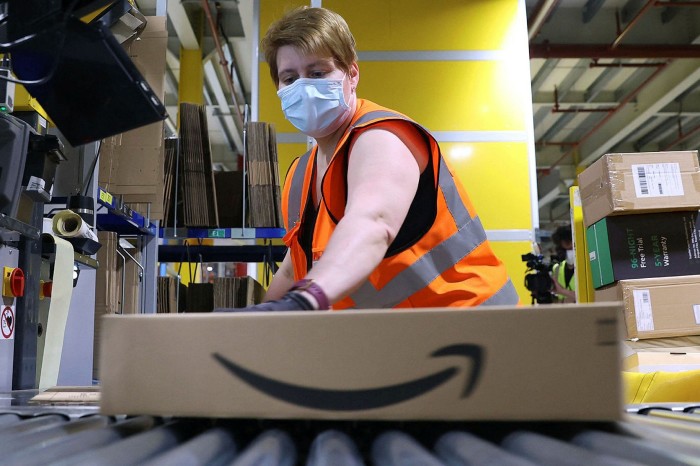In-house legal teams develop new attitude to risk

Roula Khalaf, Editor of the FT, selects her favourite stories in this weekly newsletter.
In the early stages of the Covid-19 pandemic, Pfizer chief executive Albert Bourla asked his managers: “If not us, then who?” The question gave the US pharma group a sense of urgency in the development of a coronavirus vaccine.
Speed was crucial, so Pfizer had to change how it worked. In partnership with vaccine maker BioNTech, it carried out research and development, clinical processes, and preparation for manufacturing in parallel, rather than sequentially.
“We’d never operated that way as a company,” says Doug Lankler, general counsel at Pfizer. That raised the question of what the lawyers do to facilitate it.
The answer was to rise to a challenge that many legal teams face: manage risk while helping the business achieve its goals.
The adoption of new ways of working, of thinking about risk and of decision-making has had a lasting effect at Pfizer. Beyond Covid, it has shown the legal team how fast it can work when it needs to, says Lankler. “And don’t we really need to on oncology, dementia and rare diseases?” he adds.
Most innovative in-house legal teams: North America 2021
WINNER: Pfizer*
Anheuser-Busch InBev
Accenture
Amazon
Entergy
Flex
IMF
Liberty Mutual
Uber
UPS
*Winner of the FT Innovative Lawyers award for ‘Most innovative in-house legal team in North America’; other organisations are listed alphabetically
“Lawyers are, by their nature, worriers,” he notes. But to help Pfizer move at what its executives call “the speed of science”, the lawyers had to put aside some of that worry. “The biggest thing for us was driving down decision-making so lawyers on the ground [with manufacturing teams, for example] were much more empowered to make those calls . . . you have to mitigate the risk, but we also have to take on risk,” Lankler says.
The Pfizer team also featured in the FT Innovative Lawyers North America awards for initiatives to improve inclusion and diversity. The categories for the awards (see panels below) show the range of areas in which in-house legal teams are expanding their influence.
Another critical element of an in-house team’s purpose is to maintain trust. A challenge to Pfizer’s success will be how it maintains the trust of institutions and the public now that it holds a dominant market position in the production and sale of Covid-19 vaccines.
Upholding consumer and broader social trust is a priority for legal teams in all sectors. “The role of companies has significantly changed, and legal department roles have changed significantly along with it,” says Joel Unruch, general counsel at Accenture, the IT services and consulting company. The change is driven by the shift to thinking about all stakeholders, and changes in what employees expect from employers and leaders, which includes greater transparency, he explains.
The Accenture legal team is featured for its work on diversity and inclusion, too, and for implementing new contract management tech to speed up processes and collect data to provide clearer insights on contracts.
One area where in-house lawyers are engaging with a wider set of stakeholders is in helping to set sustainability and environmental, social and governance agendas in their businesses. Jessica Gibson, associate general counsel and director at Amazon Sustainability, a division of the ecommerce company, says her team sees a chance to push governments and regulators to set new standards for carbon credits and renewable energy.
Sustainability regulations can lag behind many companies’ strategies and actions. For businesses such as Amazon, the greater risk is losing trust and credibility in the eyes of customers. “You’re not thinking as much about what regulations are, but what they might be and, ultimately, what do we want them to be — and how do we maintain that standard in the absence of those regulations?” says Gibson.
In-house legal teams: case studies
Operational management; diversity and inclusion; strategic and risk advice; and sustainability. All case studies researched, compiled and ranked by RSGI. ‘Winner’ indicates the organisation won an FT Innovative Lawyers 2021 award
Operational management
WINNER: Liberty Mutual
The legal team of the insurance company handles around 600,000 legal bills a year and receives around 20,000 emails about bills every month. So, in 2020, the lawyers created a platform to manage billing queries. Using artificial intelligence, the website is able to answer 30 per cent of questions without human input and to flag problems, such as unexpectedly high fees.
The team also has a partnership with the Massachusetts Institute of Technology on a programme involving AI to assess whether insurance claims are covered by a policy. This speeds up assessment and improves accuracy.
Anheuser-Busch InBev
Lawyers at the world’s biggest brewer created an internal website, dubbed the “content factory”, to capture and share information, research, presentations and other materials between groups of people with common interests in a specific topic — such as marketing, antitrust law, or excise tax. The groups bring together people in different legal teams around the world, and colleagues in the wider business.
Boston Scientific
In-house lawyers at the US medical device company adopted TapApp, an app developed internally, which allows people to connect with projects they would like to work on across the global business. One example is a project to update the process for public disclosure agreements, where a lawyer was seconded to work with a corporate team. The app is also used to fill staffing gaps when people go on leave. It offers a way to use the company’s own resources more efficiently and gives lawyers an opportunity to learn new skills and work on interesting projects.
Change Healthcare
The legal department at the healthcare tech company has streamlined its operations to help manage a tumultuous few years, from an initial public offering in 2019 to talks about an acquisition by insurer UnitedHealth.
The team adopted agile working practices, including so-called ‘burn down’ charts, a tool normally used by software developers to keep track of progress.
By reducing its panel of law firms and outsourcing burdensome tasks to the legal service provider Integreon and tech company UnitedLex, the team has made significant cost savings — such as on the process for drafting business associate contracts.
Hilton
Under pressure from the Covid pandemic, the legal department at the hotel group reconsidered its approach to contracting.
Calling the new strategy Lexicon, lawyers reorganised contracting professionals into cross-functional teams so they could learn from each other’s specialisms. As their main workload is in highly bespoke contracts, the focus is on increasing the skills of contracting experts and including plans to digitise parts of the process.
Contracting professionals form partnerships with other colleagues in the business to help build a closer understanding of what matters most in negotiations and how best to mitigate risk.
UPS
General counsel Norman Brothers oversees the shipping and logistics company’s internal audit, compliance, security and privacy functions, as well as labour relations for its 500,000 employees. The legal department is aiming to harmonise data across all these functions in order to take preventive measures before an employment issue becomes a legal dispute.
Data analytics on lawsuits and grievances is combined with data from compliance and security teams to identify which areas need active HR involvement. This cuts the number of legal disputes and saves money on outside counsel for labour and employment work.
Diversity and inclusion
WINNER: Accenture
The legal team has a comprehensive diversity strategy covering its relationships with outside counsel, thought leadership, and recruitment policies. The team uses a tool to track diversity data regularly from its 40-plus law firms and legal service providers. The consultancy’s in-house lawyers work with firms on their performance on diversity, providing internships, secondments and mentoring to individuals from under-represented backgrounds. They recently launched an outside counsel diversity awards programme.
Pfizer
The pharmaceutical company’s legal team are using data to help improve diversity efforts internally and among its law firms. A mentoring scheme matches a mentee to a senior figure in the business and establishes specific goals through interviews.

In addition, managers in the legal team receive special training and are using more thoughtful language, such as replacing the term “non-lawyer” with “legal professional” when referring to paralegals and legal assistants.
Prudential Financial
Lawyers at the US insurer work with nine law firms on a sponsorship programme. Firms put forward lawyers from under-represented backgrounds and the Prudential legal department provides them with additional support. Such help includes mentoring and opportunities to work with the business.
The legal team also plays a leading role in the company’s wider diversity efforts; it was the driving force behind Prudential Financial’s pay gap reporting and helped draft the company’s public diversity commitments.
Sun Life Financial
Led by Melissa Kennedy, the legal department has a comprehensive strategy for promoting diversity at the Canadian financial services group. Recent developments include making the language in job adverts more inclusive, and setting goals for diverse representation at different seniority levels, including a target of 50 per cent women in senior management globally by 2025. In-house lawyers are offered training on diversity issues and the chance to do pro bono work.
They also participate in an internship scheme for black and indigenous undergraduates.
Strategic and risk advice
WINNER: Pfizer
In the push to bring its Covid-19 vaccine to market quickly, Doug Lankler, general counsel at the US pharmaceuticals company, stripped away multiple layers of approval. This gave contracting lawyers autonomy to make decisions faster in negotiations, speeding up every stage of the process to manufacture and deliver vaccines. The company is looking to replicate the approach for other products it develops. During the vaccine development and rollout, the legal team also provided live updates to regulators to make the process of gaining approvals faster.
Change Healthcare
In-house lawyers created training videos to improve risk awareness across the digital healthcare business. Its 20,000 employees have completed compliance training, and the sales team have undertaken special courses to help with contract negotiation. The lawyers have also developed a master sales agreement template that the sales team use for 90 per cent of new contracts, and implemented data breach management tech, TechRadar. Last year, general counsel Loretta Cecil organised a mock trial to help the legal department explore and engage with the challenges of racial justice in the US.
Flex
To provide managers with greater agency in risk management, the electronics manufacturer’s legal team developed a compliance scorecard for each of its 100-plus sites around the world. The scorecard is a visual representation of a site’s compliance-related data, including risk assessments and audits, employee engagement surveys, and data from the company’s ethics hotline for reporting complaints. Access to all this information helps managers take control of compliance locally, rather than having different aspects handled separately by different teams in the head offices.
Generate Capital
Lawyers at the renewable infrastructure fund are integrated with investment teams in order to advise on strategy, as well as legal risk. An example would be making sure that important deal terms, such as reporting data, are not lost during project finance negotiations. Because early-stage projects are inherently risky, the legal team have standardised the process of reporting so that risks can be presented in a transparent and accessible way, making it easier to sell a portfolio to investors. The team’s legal operations lead has developed contract templates and a project management tool to streamline processes and help with standardisation.
Hilton
During the pandemic, the hotel company held daily, quick-fire meetings with key individuals from teams across the business, including legal. Within two weeks, this accelerated pace resulted in the launch of Hilton’s CleanStay programme, which brought in scientific advisers to help design cleaning standards in line with Covid-19 safety measures. This protected Hilton from legal risk and reassured customers. The government affairs team then created a central resource to track regulatory responses, which changed almost daily across the world. Lawyers also facilitated a scheme with credit card company American Express to provide 1m free rooms, plus meals, to healthcare workers.
IMF
Lawyers at the global financial institution adapted its frameworks to accelerate emergency lending and debt relief to member countries during the pandemic. Recently, they advised on the allocation of new special drawing rights, a form of foreign reserve asset offered by the IMF, to enable member countries to access extra funds. New facilities include a “resilience and sustainability trust”, which would lend funds to countries that need longer-term financing for challenges such as climate change. The lawyers also work alongside the IMF’s economists in advising member countries on laws and policies that promote macroeconomic stability.
In a recent project with the IMF innovation lab, the legal team ran a competition to find projects that use tech to tackle corruption.
Uber
Since he joined in 2017, when the ride-sharing app faced various litigation and regulatory battles, general counsel Tony West has played a critical role in establishing a resilient corporate structure. This has included bringing ethics, security, trust and environmental, social and governance matters under legal. When Uber’s autonomous vehicle testing resulted in a fatality, West advised the company on publishing a transparent report on the incident. After reports of sexual assaults in Uber vehicles, the legal team also helped design procedures that would encourage more victims to come forward, including banning confidentiality agreements.
Sustainability
WINNER: Amazon

The ecommerce giant now employs four full-time sustainability lawyers who work closely with the company’s sustainability department. These lawyers helped to develop Amazon’s commitment to achieve net zero carbon emissions by 2040 and to recruit more than 200 companies worldwide to sign up to its Climate Pledge initiative.
They are involved in other internal efforts, too, such as working with Amazon Web Services’ wind and renewables department on power purchase deals to access renewable energy, and an investment in electric vehicle company Rivian. The lawyers have advised on consumer initiatives including allowing customers to return items without packaging and to specify multiple orders to arrive together.
Entergy
Lawyers at the energy company concluded that a multidisciplinary approach was needed when undertaking sustainability initiatives as part of its transition from fossil fuels. At the company’s innovation lab, lawyers helped work on an idea whereby cargo ships could avoid burning diesel while waiting to unload by extending the electricity grid to ships at Port Fourchon, south Louisiana.
Elsewhere, lawyers helped develop and deploy a robot that provides automated advice on the support programmes available to customers who are struggling to pay their energy bills.
Uber

The company has long-term plans to promote shared mobility, whether in ride-sharing or public transport. However, this also presents risks for the company, which has said that all of its rides, globally, will be fully electric by 2040 globally.
Uber has also pledged to bring greenhouse emissions down to net zero by 2040 across the company. The legal team has had to plan how to make this transition without an adverse effect on drivers, while also helping them to buy electric vehicles and securing discounts for charging stations.
Comments